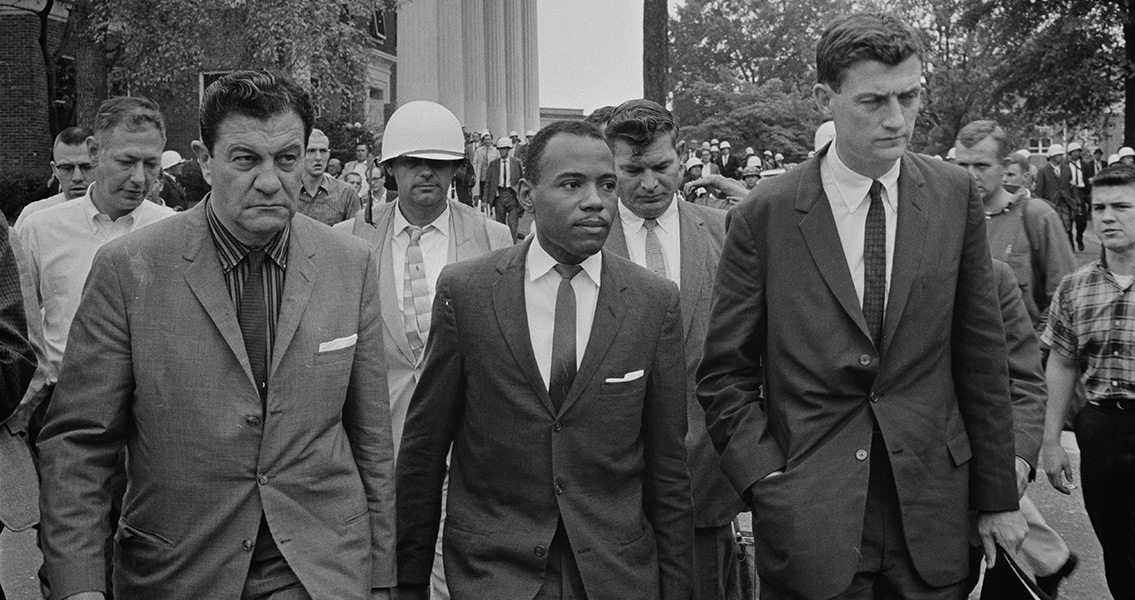<![CDATA[The 30th September, 1962, marked a bloody landmark in the fight for equality in the United States as a riot erupted over the admission of the first black student to the University of Mississippi. James H. Meredith, an African American who had served in the US Airforce, successfully applied to 'Ole Miss' - as the University of Mississippi was known - in 1962. However, once the registrar realised Meredith was an African American his admission to the university was revoked. A long legal battle followed. In 1954 the Brown vs. Board of Education ruling had created federal legislation for the desegregation of public schools. Still, in the intervening 12 years Ole Miss had yet to accept an African-American student, something which increasingly made it a target of civil rights activists. Meredith's case developed into a test for the force with which the Brown vs. Board of Education ruling would be enforced, and a federal court ordered Ole Miss to admit Meredith. Quickly, the issue became a political battleground in the conflict between federal and state power, with some historians going as far as to refer to it as the last battle of the US Civil War. Mississippi governor Ross Barnett, a man who publicly declared his support for continued racial segregation, faced up to President John F. Kennedy, an advocate of civil rights. Barnett stated that Ole Miss would not have to follow the federal court ruling. On 20th September Meredith tried to enroll at the University, but his access to the admissions office was blocked by Barnett himself. Over the following days a heated exchange took place between Kennedy and the Mississippi governor. A week later, on 28th September, Barnett was charged with civil contempt and ordered to cease his interference in Ole Miss admissions or face imprisonment and a heavy fine. Federal government had asserted its authority over state, attacking the continued reactionary influence in Mississippi politics, but the crisis had yet to reach its tragic conclusion. US Marshals were deployed to the town of Oxford, where the Ole Miss campus was situated, to protect Meredith, on the 29th September. Meanwhile, Barnett delivered an inflammatory speech at a university football game. The town of Oxford was turning into a battleground, as University of Mississippi historian Chuck Ross told NPR in 2010, Barnett's speech was "A call to arms ... 'We're getting ready to be invaded, we really want you as a Mississippian, a white Mississippian, to respond,' " As Meredith attempted to enroll in his classes on the 30th September, escorted by a contingent of US Marshals, his access to the university was blocked by a group of 2,000 protesters. Violence erupted as the U.S. Marshals engaged the massive group of white supremacist and segregationist protesters. The federal forces deployed tear gas in an attempt to disperse the mob, which in turn led to a violent retaliation with rocks and other objects thrown as chaos descended. As night fell shots started to be fired, and members of the mob started to attack white university staff who had publicly supported Meredith's admission to Ole Miss. By the end of the 30th September two people had been killed and hundreds injured. Kennedy deployed the National Guard to Oxford, Mississippi, in a move which saw over 30,000 troops occupying the town. Meredith finally commenced his studies at the university on 1st October, 1962, after the massive build up of government troops had restored order. Although a major victory in that it showed the US federal government would use force if necessary to uphold the Brown vs. Board of Education ruling, the riot in Ole Mississippi also highlighted the continued power and influence of white supremacists, both in state government and through organisations such as the Ku Klux Klan, in parts of the South.]]>
Desegregation Starts Riot at Ole Miss
